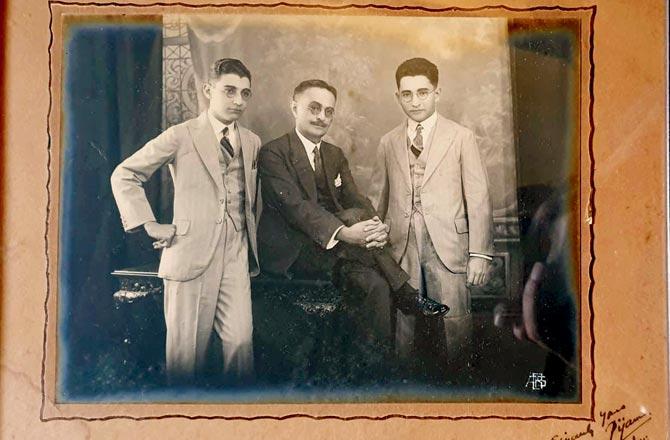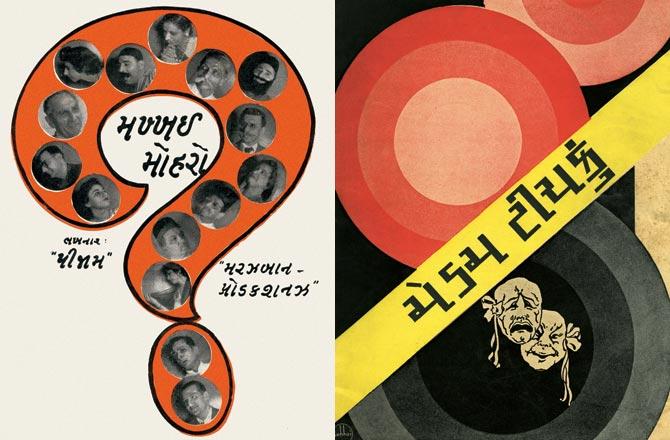On what may be their first New Years Day when Bombay Parsis wont enjoy naataks in theatre halls, heres celebrating the legacy of Adi Marzbans less known playwright-editor father, PJ Marzban aka Pijam

The Marzban children, Adi, Jer and Rustom with their pet leopard. Pic courtesy/Meher Marfatia, Laughter In The House: 20th-Century Parsi Theatre
 A charming heiress, a good-looking but villainous doctor, a timid lover, a crafty detective, a singing girl, a Nawab in his dotage and a dancing woman—in a photo drama that rings with love, hate, villainy, fidelity... fascinating and thrilling story of social life, starring the beautiful and emotional Miss Thelma Wallace and Miss Yvonne Wallace."
A charming heiress, a good-looking but villainous doctor, a timid lover, a crafty detective, a singing girl, a Nawab in his dotage and a dancing woman—in a photo drama that rings with love, hate, villainy, fidelity... fascinating and thrilling story of social life, starring the beautiful and emotional Miss Thelma Wallace and Miss Yvonne Wallace."
ADVERTISEMENT
So announced ads summarising in superlatives Kohinoor Film Company's 1925 silent saga, Fankdo Fituri (Handsome Blackguard). "The magnificent Parsee-Hindu-Muslim screen romance, from the extremely popular, sensational novel by Pijam", cast, with the fetching Ms Wallaces, director-actor Homi Master himself as Yakub the sleuth, Moti, Behram Vasunia, Fram Sethna and KB Athavale as the eponymous blackguard.

Ensemble cast and crew of a 1955 Calcutta Parsi Amateur Dramatic Club (CPADC) staging of Pijam's Makhkhai Mohro, the first CPADC production assigning women the female roles earlier performed by male actors
Feted for his exciting presentation of embroiled plots in brazenly melodramatic manner, Master scored another surefire hit. Discerning audiences attributed Fankdo Fituri's appeal to its sparkling original writing. They were always full of admiration for the author, Pirojsha Jehangirjee Marzban, pen name Pijam anagrammed from his initials PJM.
Two generations ahead of Pijam produced stalwart pressmen ably moulding the Marzban legacy. This early lineage stretches back to Mobed Fardoonjee Marzbanjee (1787-1847), Pijam's grandfather, respected as a great Orientalist. Surat-born to a Kadmi priestly clan—Kadmi, Fasli and Shahenshahi form the trio of Zoroastrian sects —with his father and grandfather scholars of Avestan texts, the patriarch merits lasting recognition on several scores.

PJ Marzban, popular playwright and Jam-e-Jamshed editor. Pic courtesy/Feroz Dubash
Most significantly, Fardoonjee started the first vernacular printing press in 1812 and established Asia's oldest, continuously running periodical, The Bombay Samachar, on July 1, 1822. A valuable template for subsequent Parsi-helmed publications like the Indian Spectator, eventually Voice of India, Fardoonjee's paper appeared weekly till 1832, bi-weekly till 1855 and daily since, as Mumbai Samachar.
Fardoonjee is declared "the Caxton of the Gujarati Printing Press" in HD Darukhanawala's classic, Parsi Lustre on Indian Soil, an allusion to William Caxton's introduction of the printing press in 15th-century England. A remarkable reel of achievements earned him high repute as the Father of Gujarati printed literature.

Pijam with his sons Rustom and Adi. Pic courtesy/Manek Guzder
Three years following his arrival from Surat, Fardoonjee opened a bookbinder's shop in Bombay in 1808. Pioneering vernacular journalism in the country and, very importantly, the production of Gujarati typefaces, he published the first Gujarati calendar in 1814, corresponding to the Hindu Samvat Year 1871. Unfortunately, no known copy of this almanac survives.
Carrying on Fardoonjee's print endeavours were Behramjee Fardoonjee Marzban (1826-1895), the second of his three sons, and his grandson Jehangirjee Behramjee Marzban (1848-1928). Jehangirjee worked his way up from proof-reader to partner at the 1832-established Jam-e-Jamshed, meaning "goblet of Shah Jamshid" in which the future was supposed visible. Initially a weekly, like its current avatar (it converted to a daily broadsheet for years from 1853), Asia's second-oldest surviving newspaper rolled from a distinctive red brick building at Ballard Pier, on the road still sign-boarded Adi Marzban Path, in memory of the playwright and Jame's last editor who was a Marzban.

Lawyer Feroz Dubash at the antique "partner's desk" - used by two people facing each other—and chair of his great-grandfather Pirojsha Marzban
The ancestral press flourished under Jehangirjee's proprietorship. Possessed of a fine writing style and ready wit, for which the humourist was hailed "the Mark Twain of the Parsis", he reigned among the city's successful, influential newspapermen. Prior to the Jame he edited the Gujarati magazine Noor-e-Alam, Nure Elam in Persian. JB Marzban also managed three leading English dailies – The Times of India, The Advocate of India and The Bombay Gazette, even printed on silk.
Jehangirjee's friends were drawn from performing artistes and press personalities of the day. One was actor Framroz Joshi, superintendent of the Government Central Press, whose roles in the 1860s, when actresses were banned onstage, included the female lead of The Lady of Lyons, rendered with aplomb in Gujarati by the Gentleman Amateurs Club.

Programme covers of Pijam's plays Makhkhai Mohro and Madam Tichku
An active member of the Bombay Municipal Corporation, JB Marzban was the first Parsi journalist publicly honoured by the government with a CIE, Companion of the Indian Empire. Despite championing women's education, Jehangirjee held reactionary views. His motto for social reform and as a policy for the paper—Festina lente—was an oxymoron of wisdom, though. Latin for "hasten slowly" or "proceed with prudence", a phrase preferred by grand civilizations and dynasties, particularly the emperors Augustus and Titus, as well as the Medicis. The Roman historian Suetonius tells us Augustus deplored rashness in military affairs.
"Besides being a renowned dramatist, Jehangirjee's son Pirojsha really grew the Jame as a paper, nurturing it, bringing it up," says Ardeshir Dubash, chairman of Concern India Foundation. The grandson of Pirojsha Jehangirjee Marzban (1876-1933), Dubash and his sister Manek Guzder are the children of Pijam's only daughter Jer. The sons were Rustom, nicknamed Lulu, and Adi Marzban. Incidentally, Dubash's son Feroz is named after Pirojsha, spelt slightly different, and Feroz's little son Jehangir after Jehangirjee.
Pirojsha is credited with an extraordinarily prolific oeuvre in his short life: 15 volumes of fiction, comic essays and plays scripted assuming the pithy nom de plume Pijam. Versatility was a hallmark of these literary contributions, from fiery criticism of civic issues to feather-light musings for Gup-Sup, India's answer to Tit-Bits, which he edited briefly. Darukhanawala's tome describes: "Pijam revealed himself a master of Gujarati language, in his hands a pliable weapon used deftly to extract tears or provoke mirth from readers."
Playwriting was a passion PJ Marzban pursued with steady proficiency. His notable scripts included Makhkhai Mohro, Madam Tichku, Mazandaran and Maasi No Maako. Wowing packed houses, some won wider adulation as celluloid adaptations. His journalistic flair evident right from Elphinstone College years, Pijam became the Jam-e-Jamshed editor, seen at the vanguard of Zoroastrian religious sentiment.
A difference of opinion in private matters decided the duration of Pirojsha's professional innings at the Jame and Bombay Samachar. "When he wanted to marry my grandmother, Ratanbai, she was just 15 or 16," shares Dubash, who has reignited the family association with the bi-lingual tabloid Jame version. "He was the eldest son of his father, displeased by the alliance on account of his daughter-in-law's tender age. Cutting off Pijam from the business, he had nothing to do with the couple. Not till the birth of their first son was there a rapprochement. Jehangirjee reinstated Pirojsha in the fold and at Jame. While Pijam had been cast out, he was approached by Muncherjee Cama to join the Samachar as an editor."
An unsolved mystery for the family involves the naming of Pijam and Ratanbai's children. Why the firstborn, registered as Adi on the birth certificate too, was renamed Rustom—once the couple had a change of mind when their second boy came along—is anybody's guess. Seemingly fixated by the name, they called the new baby Adi instead. Plays Rustom wrote and staged, proved minor compared with those of his younger brother Adi Marzban, writer-director doyen of Gujarati and English theatre.
What, vitally, were the defining editorial stances of father and son, JB and PJ Marzban? Their individual temperaments left a unique stamp on Bombay press circles, Mitra Sharafi mentions in her book, Law and Identity in Colonial South Asia: Parsi Legal Culture, 1772-1947. When Jehangirjee needed a break from critics, he retreated in the Matheran hills to Red House, the Marzban villa. If both men emerge old-fashioned, Pijam was amiably softer dispositioned.
"Jehangir Behramjee Marzban had spent decades in the wily world of Bombay journalism and Parsi community politics. The 'father of Parsi journalism' was a veteran of Bombay's libel wars," she writes. "His son, PJ or 'Pijam', was a well-known satirist with orthodox leanings… The younger Marzban's correspondence suggested his father ruled Jam-e-Jamshed with an iron grip. In a letter to a family member, the son explained he could not publish the relative's writing because 'Pa would come down on my poor head like lightning and thunder.' As Marzban senior told the Bombay High Court in a libel suit, 'Whenever there is anything out of the common, it is a rule in the office to refer to me.'"
On marrying, Pijam moved out of the single-storey family bungalow, Shalimar, now Delstar building on Hughes Road. Residing near Cama Baug, he and Ratanbai finally settled at Chapsey Terrace on Altamont Road. "The sitting room there was his library, with specially fitted cupboards for books. This was Adi Mama's space to rehearse his plays," recollects Dubash. Neighbours remember diminutive Ratanbai dress exclusively in black sarees through long years of widowhood till her death in the 1970s.
Pijam and Adi Marzban's productions impressed with scene, set and light design. Each brought journalistic experience to plays which shone natural, relevant, yet entertaining. In addition to the appointment as a Justice of the Peace, PJ Marzban served as Sheriff of Bombay, often accompanied for official events by his daughter Jer.
To quote Parsi Lustre on Indian Soil again: "PJ Marzban's journalistic mantle has fallen upon his talented sons Ardeshir and Rustomji, worthily treading the path chalked out by their revered grandfather and father."
The rest is happy history.
To the city's Gujarati theatre fans sorely missing a live play today, we say, catch what you can online and look forward to next year. Navoze Mubaarak—Parsi naatak jivto reh!
Meet the Marzbans
Fardoonjee Marzbanjee (1787-1847)
Behramjee Fardoonjee Marzban (1826-1895)
Jehangir Behramjee Marzban (1848-1928)
Pijam: Pirojsha Jehangirjee Marzban (1876-1933)
Adi Marzban (1914-1987), siblings Rustom Marzban & Jer Dubash
Author-publisher Meher Marfatia writes fortnightly on everything that makes her love Mumbai and adore Bombay. You can reach her at meher.marfatia@mid-day.com/www.mehermarfatia.com
Keep scrolling to read more news
Catch up on all the latest Mumbai news, crime news, current affairs, and a complete guide from food to things to do and events across Mumbai. Also download the new mid-day Android and iOS apps to get latest updates.
Mid-Day is now on Telegram. Click here to join our channel (@middayinfomedialtd) and stay updated with the latest news
 Subscribe today by clicking the link and stay updated with the latest news!" Click here!
Subscribe today by clicking the link and stay updated with the latest news!" Click here!






